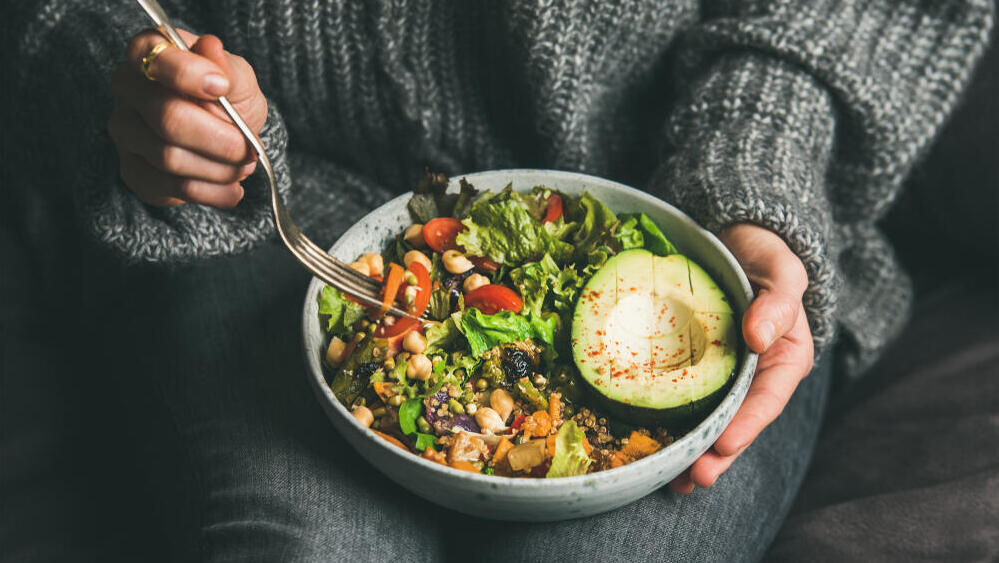The debate regarding the effects of a vegan diet on health has been ongoing for years, with supporters and opponents presenting various arguments. While research highlights numerous benefits, it also points out several drawbacks. Which key components are essential to include in a vegan diet to prevent nutritional deficiencies that may impact health?
Read more:
Vitamin B12: Not only in animal products
One of the main concerns for vegans is obtaining an adequate amount of vitamin B12, essential for nerve function and red blood cell production. Since vitamin B12 is primarily found in animal products, vegans need to incorporate fortified foods or supplements. Plant-based sources of B12 include fortified plant-based beverages (plant milk), yeast and fortified grains.
Iron: Supplementing iron-rich foods with vitamin C
Iron is a vital mineral for transporting oxygen in the blood. Plant-based iron is less easily absorbed than iron found in animal products. To enhance iron absorption, consume foods rich in vitamin C alongside plant-based iron sources, such as lentils, beans (including soybeans), tofu, quinoa, tahini (preferably whole sesame), chard, nuts and seeds, combined with fruits like oranges, kiwis, tomatoes or red, yellow or orange bell peppers.
Protein: Include in every main meal
Meeting protein requirements in a vegan diet can be achieved by combining various plant-based protein sources. Legumes such as beans, lentils, chickpeas and edamame (soybeans) are excellent protein options. Additionally, tofu, tempeh and seitan are diverse protein-rich foods. Quinoa, amaranth and whole grains combined with protein-rich foods also contribute to fulfilling protein requirements. It's advisable to ensure each main meal includes protein-rich food.
In conclusion, achieving a balanced vegan diet requires careful planning. Remember that the key is in the combinations and variety of foods rather than focusing solely on specific items. Consuming a variety of nutrient-rich foods and ensuring the intake of vital nutrients like B12, iron, protein, calcium and zinc will help ensure optimal health.
Calcium: Found in Legumes and green vegetables
Calcium is an essential mineral for bone health and the immune system, being the most abundant in the body. Most of the body's calcium is concentrated in the bones and teeth. A deficiency can lead to bone softening, an increased risk of fractures, and the worsening of osteoporosis. In Western diets, dairy products are a primary source of calcium, posing a challenge for vegans to meet their calcium needs.
Good amounts of calcium can be found in legumes, including soy spreads and tofu, almonds, walnuts, pecans, whole sesame tahini and green vegetables (spinach, cabbage, kale, bok choy, broccoli, beet greens, asparagus, lettuce) and also sesame seeds (for those who enjoy sesame cakes, for example).
Zinc: Found in seeds and whole grains
Zinc is an essential mineral for the immune system, wound healing, growth and more. It's present in various plant foods, but its absorption can be affected by factors like phytates found in grains and legumes.
To improve zinc absorption, it's not only advisable to enrich the diet with high-zinc foods but also to address absorption inhibitors. For instance, soaking and sprouting legumes can enhance the absorption of minerals. Additionally, consuming fermented foods like tempeh can improve its bioavailability. Zinc is also abundant in pumpkin seeds, pine nuts, sunflower seeds, whole grains and quinoa.
It's important to note that consuming caffeine-rich coffee or tea close to meal times is not recommended, as caffeine can interfere with the absorption of some minerals.
 Ayelet Melnik
Ayelet MelnikAdditionally, it's crucial to conduct annual blood tests to check for deficiencies and consult with a dietitian if necessary.
Recipes to help you plan a proper vegan menu:
Coconut Tapioca Pudding:
Ingredients:
- 250 ml coconut milk
- 3 cups water
- 3 tablespoons sugar
- 1 teaspoon pure vanilla extract or vanilla bean
- 3/4 cup tapioca pearls
Instructions:
- Bring everything except the tapioca pearls to a boil, then add the pearls and reduce the heat.
- Stir frequently throughout cooking to prevent clumping.
- When you start to see shiny bubbles and the mixture thickens slightly (about 10-12 minutes), turn off the heat and continue stirring occasionally – the pearls continue to cook in the residual heat.
- When the mixture has cooled slightly, transfer it to a sealed container. Keep refrigerated for up to a week.
- Serving: In a glass or tall cup, place a few spoonfuls of the pudding, topped with chopped fruits, chia seeds, toasted coconut flakes, chopped nuts, or roasted seeds (unsalted), and whatever else you like.
Energy bars:
Ingredients:
- 2.5 cups whole oats
- 0.5 cup natural pecans
- 0.5 cup natural almonds
- 0.5 cup shelled pistachios
- 0.5 teaspoon cinnamon
- Nutmeg pinch
- 1 tablespoon chia seeds (optional)
- 2 tablespoons sesame seeds
- 3 tablespoons honey / natural silan / maple syrup
- 1 tablespoon brown sugar
- 30 grams butter / 25 grams coconut oil (heaping tablespoon)
- 1 teaspoon pure vanilla extract
- 0.5 teaspoon coarse salt
Instructions:
- Preheat the oven to 160 degrees Celsius.
- In a small saucepan, heat the honey, sugar, butter/coconut oil, and vanilla until melted.
- Grind all remaining ingredients in a food processor until a coarse mixture forms (if you don't have a processor, chop the nuts and mix in a bowl).
- Add the butter and sugar mixture and mix well.
- Flatten on a baking sheet lined with parchment paper and press firmly.
- Bake for about 25 minutes or until lightly browned.
- Cool and cut/break into bites (after 10 minutes of baking, remove, cut into rectangles, and return for an additional 20-15 minutes of baking).
- Store in an airtight container at room temperature.


